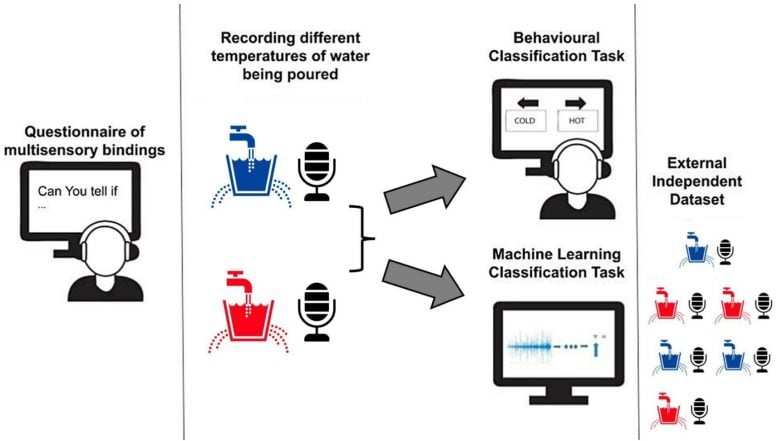Scientists at the Ivcher Institute explored how humans perceive water temperature through its sound using machine learning, confirming that this sensory ability, likely developed through life experiences, can be accurately analyzed and classified by algorithms. Credit: SciTechDaily.com
Researchers demonstrated that humans can perceive water temperature through sound, an ability likely developed through exposure, suggesting potential for new sensory brain maps and advanced perceptual skills.
Researchers from the Ivcher Institute for Brain, Cognition, and Technology (BCT Institute) at Reichman University (IDC Herzliya) have uncovered a largely overlooked perceptual ability, using 
A questionnaire examined people’s beliefs about cross-modal perception, participants’ perceptual ability was tested in an online 2AFC task using recordings captured in an ambisonic facility. The recordings were also used to train a machine-learning model to perform the same classification. Credit: Ivcher Institute for Brain Cognition and Technology, Reichman University
“Temperature perception is pretty unique in comparison to other sensory experiences,” says Dr. Adi Snir, a postdoctoral fellow at the BCT Institute and co-author of the study. “For vision and hearing we have dedicated sensory ‘organs’ like the eyes and ears, with temperature we rely on specialized receptors in the skin that respond to various temperature ranges which we experience as heat and coolness, but in the animal kingdom we know for example that snakes can actually ‘see’ body heat which allows them to identify prey.”
The question of whether multisensory perception of temperature extends to humans has been posed before. “Previous studies have explored this on a behavioral level,” states Prof. Amir Amedi, founding Director of the BCT Institute. “These studies have shown that humans can hear a difference between hot liquids and cold liquids being poured, but not how or why this is possible,” he explains.
Investigating Multisensory Perception
The researchers set out first to replicate previous findings and confirm this surprising perceptual ability, as well as clarify whether or not this ability is innate or acquired, a question that has long been the subject of much debate. “We also wanted to investigate whether or not people are consciously aware of these differences in the sound properties of thermal differences,” says Snir, “and also explore what characteristics of the sounds themselves allow for differentiation in perception,” he adds.
To accomplish this, the team used a pre-trained deep neural network (DNN) to characterize recordings of various temperatures of water being poured, a machine learning algorithm to classify the thermal properties of the water, and computational analysis of the auditory features of each recording. “What we saw is that participants were consistently able to discern water temperature through its sound, even when they didn’t believe that they could, which tells us this is likely an implicit skill acquired through exposure to auditory cues throughout life,” Amedi explains, “simultaneously the machine learning model which was trained on recordings of hot and cold water showed a high DOI: 10.3389/fpsyg.2024.1353490
















%20(2)%20(1).jpg)


Discussion about this post